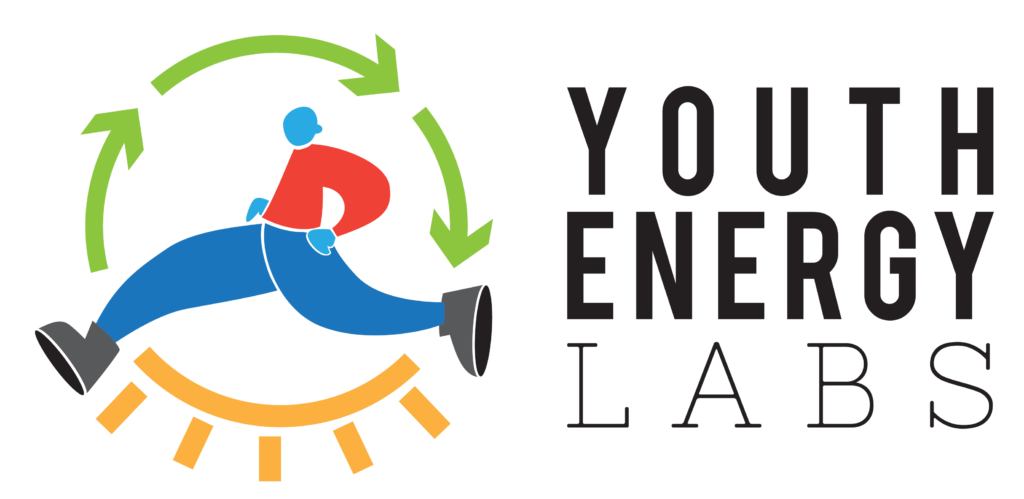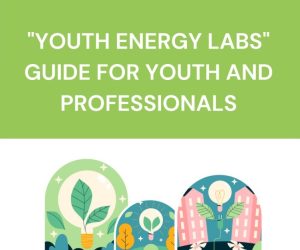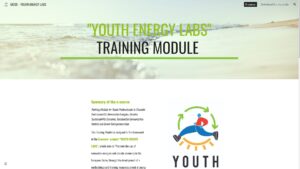As part of the Youth Energy Labs project, partner organizations have created a detailed research report titled «Report on the training needs of youth workers in the field of renewable energy use, circular economy, consumption patterns, and sustainable entrepreneurship«.
This research lays the groundwork for developing training labs aimed at engaging both youth workers and young people in essential environmental issues. The objective is to provide professionals with the tools and knowledge necessary to enhance environmental awareness among the younger generation. Moreover, this report can be an asset for other organizations involved in similar initiatives, offering insights and recommendations to support their efforts in promoting sustainability and environmental education.
Key Findings
Environmental sustainability: youth workers indicated they possess a good amount of knowledge in this field, particularly regarding climate change, resource management and the protection of biodiversity. Nonetheless, there are still gaps in their understanding of specific issues, such as the causes and effects of climate change and the dangers of overexploiting natural resources. Many youth workers also recognize the necessity for strategies that assist young people in coping with eco-anxiety and participating in proactive environmental stewardship.
Sustainable consumption: although some youth workers are aware of the environmental effects of products like plastics and textiles, there is a lack of understanding regarding sustainable consumption labels and certifications. The report emphasizes the importance of training on sustainable consumption habits, product certifications and the social consequences of consumption decisions.
Sustainable entrepreneurship: this area is the least familiar to youth workers, with many expressing limited knowledge of essential concepts such as green entrepreneurship, eco-ethics and sustainable business models. There is a distinct need for training that offers insights into sustainable business practices and methods for distinguishing genuine green businesses from those that engage in «greenwashing». The report highlights five key areas where youth workers feel they require additional training to effectively support young people on environmental topics:
Renewable energy: although renewable energy is a relatively familiar subject, with nearly half of the youth workers indicating some knowledge, there are notable gaps. Most professionals are aware of solar and wind energy, but they lack familiarity with other forms such as geothermal, biofuel and tidal energy. Many expressed a desire for updated information on energy transition and practical tools to encourage energy efficiency.
Circular economy: fewer than half of the respondents (46.89%) are acquainted with the concept of a circular economy, and only 11.36% report having strong knowledge. This indicates a need for foundational training on the circular economy, especially in grasping core principles like eco-design, product life cycles, and zero-waste strategies. Professionals showed interest in learning more about the economic and social advantages of this model.
The report highlights that while youth professionals are eager to educate young people about sustainability, they often feel ill-equipped in several important aspects. Many professionals, particularly those from Latvia, report a lack of confidence in their ability to enhance environmental awareness. This uncertainty stems mainly from a lack of knowledge and resources in areas such as renewable energy, circular economy and sustainable entrepreneurship. Nonetheless, there is a clear willingness to improve, with over 80% of youth workers showing a strong interest in additional training, especially to empower them to inspire and educate the next generation of environmental leaders.
RecommendationsTo bridge these training gaps, the report suggests several strategies:
Tailored training: training programs should be designed at both basic and advanced levels, allowing youth workers to select the depth of knowledge they require in each environmental field. This approach would ensure that all professionals, regardless of their initial expertise, can effectively acquire and implement new skills.
Interactive learning: incorporating practical case studies, hands-on activities, and real-world examples is crucial for helping youth workers translate theoretical knowledge into practice. Training should also emphasize the development of communication skills to make complex topics more accessible and engaging for young people.
Hybrid training formats: a mix of online and in-person sessions would offer flexibility while ensuring that youth workers can engage in practical activities and benefit from collaborative learning experiences.
Continuous learning resources: given the fast-paced evolution of environmental topics, the report advocates for providing youth workers with ongoing access to current resources and platforms, allowing them to stay updated on the latest advancements in renewable energy, circular economy, and other essential areas.
By following these recommendations, youth professionals will be more prepared to help the younger generation embrace sustainable practices and take an active role in the ecological transition.




